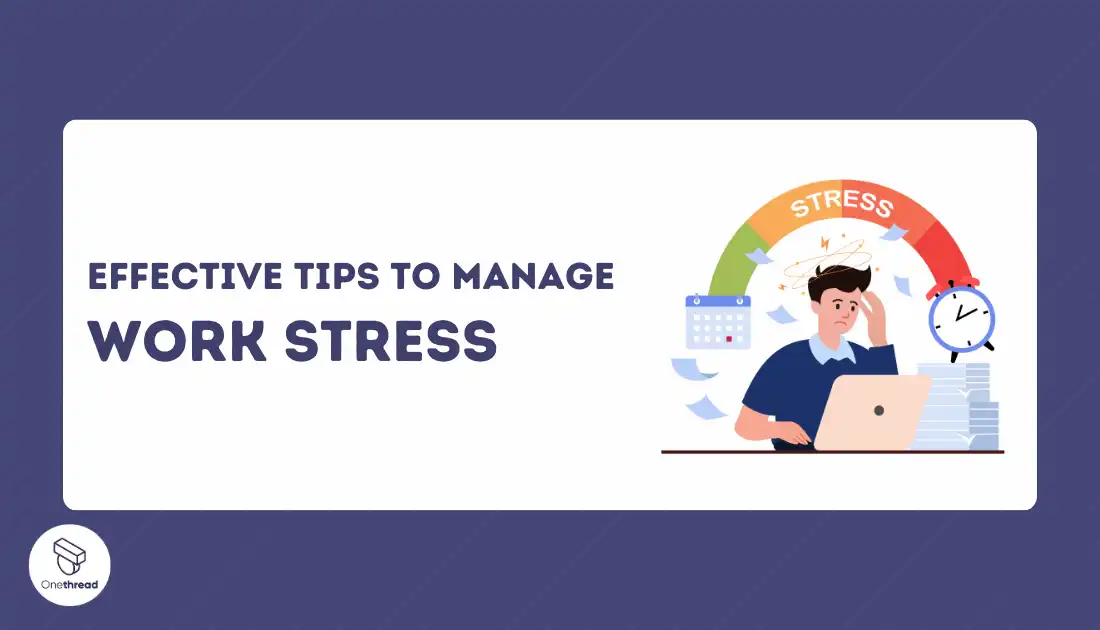A stressful work environment can hamper both your physical and mental well-being, impacting productivity.
Common physical symptoms of work stress include headaches, stomachaches, sleep disturbances, irritability, and difficulty concentrating. Chronic stress can lead to anxiety, insomnia, high blood pressure, and a weakened immune system. Mentally, stress can cause burnout, decreased motivation, and difficulty making decisions.
To cope with work stress, prioritize self-care, practice stress management techniques like exercise or meditation, and seek support from colleagues or a counselor. By addressing the signs and finding healthy ways to recover, you can mitigate the negative effects of a stressful workplace.
Learn how to recognize signs, understand their effects, and discover effective ways to manage work-related stress.
Key Takeaways:
- Recognize the Signs: Understanding the physical and emotional symptoms of work stress, such as headaches, fatigue, and irritability, is crucial for early intervention.
- Effective Management Strategies: Taking breaks, exercising, practicing mindfulness, and communicating concerns are essential techniques to manage and reduce stress at work.
- Build Resilience: Learning from mistakes, asking for help, staying positive, and setting small goals can help you become more resilient to work stress.
- Seek Help When Needed: Don’t hesitate to talk to your supervisor, utilize Employee Assistance Programs (EAPs), or seek professional help if work stress affects your well-being.
What is Work Stress?
Work stress is when someone feels tense, worried, or overwhelmed because of their job. It can happen when the work is too hard, there’s too much to do, or when they don’t get along with coworkers or bosses. Work stress can make people feel tired and upset, and can even make them sick. It’s important to find ways to deal with this stress so it doesn’t take over your life. There are 2 types of work stress:
Positive Stress
Positive stress, or eustress, can motivate and improve focus. For example, a tight deadline can boost productivity, leading to a sense of accomplishment after meeting the goal.
Negative Stress
Negative stress, or distress, occurs when the pressure becomes overwhelming, leading to burnout and health issues. An example is constant overwork without adequate rest, causing exhaustion and reducing job satisfaction.
Sources/Causes of Work Stress: Common Work Stressors
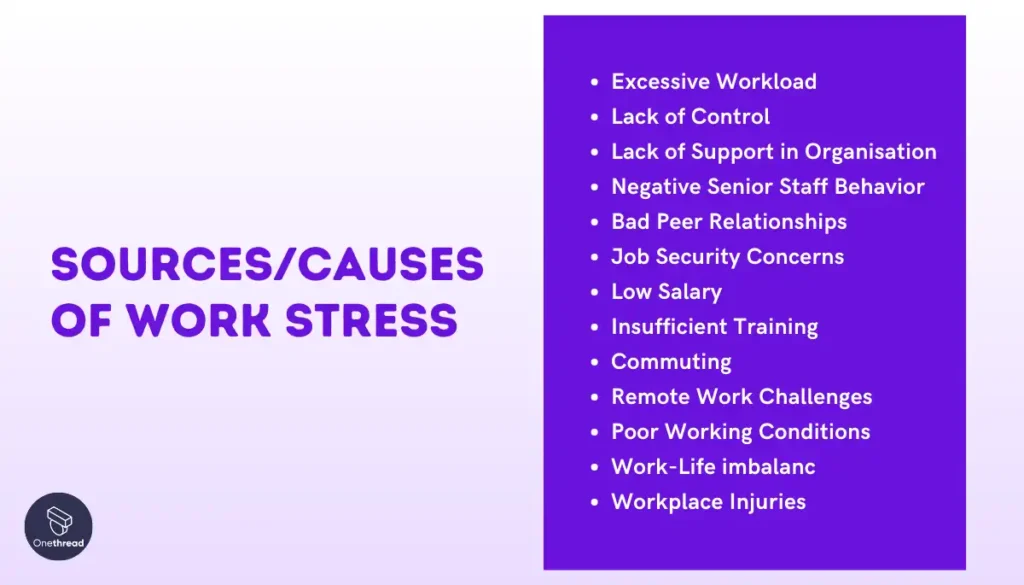
Common sources of work stress include having too much work and not enough time, tight deadlines, and high expectations. Stress can also come from not having clear instructions, not feeling supported by coworkers or bosses, and fear of losing the job.
Conflicts with others at work, doing tasks that don’t fit your skills, and not being recognized for good work can also cause stress. Changes in the workplace, like new management or job roles, add to the stress people feel at work. Let’s go into the top 10 culprits and explore strategies to combat them:
- Excessive Workload: Overwhelming tasks and tight deadlines can lead to stress. According to CIPD, workload is the most common cause of work-related stress, with 73% of employees citing it as a major stressor.
- Lack of Control: Feeling powerless in work processes, decision-making, and meeting performance targets contributes significantly to stress. About 31% of respondents identify a lack of control as a stressor.
- Lack of Support in Organisation: Inadequate support from colleagues, supervisors, or managers can intensify work-related stress, as reported by 29% of UK employees.
- Negative Senior Staff Behavior: Negative behavior from managers, such as being critical or unsupportive, can significantly impact employees’ mental health, with 27% citing senior staff as a cause of stress.
- Bad Peer Relationships: Poor peer support can reduce resilience in employees, contributing to increased stress levels. Research indicates that 20% of employees consider their peers a source of stress.
- Job Security Concerns: While job security is important, its impact on stress levels is relatively lower, with only 16% of employees citing it as a significant stressor. For many, the appeal of passive income opportunities and the chance to make money online are key factors in reducing stress and increasing job satisfaction in remote work settings.
- Low Salary: While not directly addressed in the data, low salaries can significantly contribute to stress. If this resonates, consider exploring career advancement opportunities, negotiating for a raise, or seeking additional income streams.
- Insufficient Training: Inadequate training can lead to poor job performance and increased stress levels, as reported by 14% of employees.
- Commuting: The commute to work, though ranking lower on the list, can still be a source of stress for 12% of employees, particularly with disruptions to daily routines and reduced free time.
- Remote Work Challenges: Despite the increasing prevalence of remote work, 8% of employees still find it stressful known as “work-from-home burnout”, indicating challenges in adapting to hybrid work models.
- Poor Working Conditions: Poor working conditions, like unsafe environments, lack of proper tools, or too much noise, can make employees feel stressed and worried about their safety and comfort, reducing their focus and productivity.
- Work-Life imbalance: An imbalance in work-life equilibrium happens when work takes up so much time and energy that it interferes with personal life, family, and relaxation, leading to exhaustion, frustration, and less time for personal interests or relaxation.
- Workplace Injuries: Fatigue, illness, distracting job demands, and high psychological strain all increase vulnerability to traumatic injury like Slips, trips, Being struck by or striking objects, Motor vehicle incidents, and falls
For some, nicotine pouches offer a smokeless alternative to smoking for stress management, but healthier strategies are still essential.
These causes of work stress are supported by various studies and research findings, highlighting the multifaceted nature of workplace stressors.
Effects of Work Stress
Work stress can lead to physical symptoms like headaches and fatigue, emotional problems such as anxiety and depression, decreased productivity, and strained relationships at work and home. In the long run, it may contribute to serious health issues like heart disease.
Here are some of the most common effects of work stress and their symptoms:
Physiological Effects of Work-Related Stress
Work-related stress increases the risk of cardiovascular disease by elevating cholesterol, blood pressure, and blood sugar levels. Stress weakens the immune system, leaving you more susceptible to illnesses.
High cortisol levels due to stress can cause changes in appetite and digestive patterns. Furthermore, prolonged stress can contribute to serious health issues like strokes, backaches, headaches, ulcers, and heart disease.
Managing stress through exercise, relaxation techniques, and a balanced lifestyle is crucial to mitigate these harmful physiological effects and maintain overall well-being.
Physiological work-related stress has short-term and long-term effects. Both impact overall well-being significantly.
Short-Term Physical Effects of Work Stress
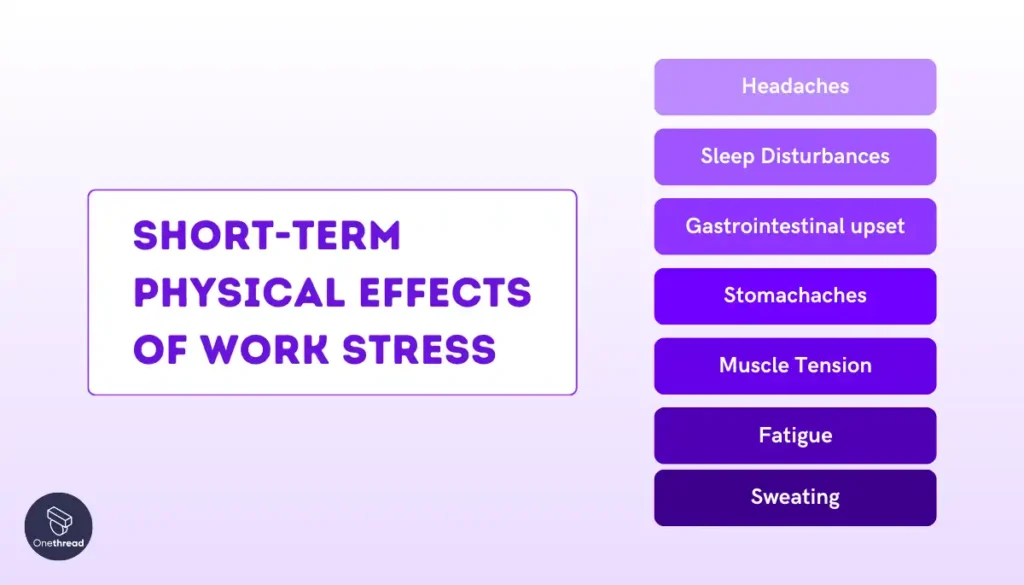
NIOSH identifies early indicators of job stress as follows:
1. Headaches
Frequent tension headaches are a common short-term effect of job stress. When stressed, muscles tense up, often leading to pain, pressure, and headaches. This can reduce productivity and quality of life.
Causes
- Muscle tension from anxiety/worry
- Changes in posture from increased desk work
- Dehydration/fatigue
2. Sleep Disturbances
Work stress can make it difficult to fall or stay asleep. Short-term sleep loss impairs concentration, and decision-making, and increases irritability.
Causes:
- Anxiety/worry interfering with the ability to relax
- Alterations in circadian rhythms from long or irregular hours
- Consumption of stimulating substances like caffeine
- To combat these issues, apps like ShutEye can provide tools and resources to help improve sleep quality and establish better sleep habits.
3. Gastrointestinal upset
Work stress can lead to gastrointestinal upset. Additionally, musculoskeletal disorders may arise from repetitive physical demands and awkward postures, causing joint, muscle, and spinal disc injuries over time. Symptoms include pain and reduced mobility.
4. Stomachaches
Stress hormones and inflammation can irritate the digestive tract, causing abdominal cramping, discomfort, and diarrhea episodes. Chronic stress also negatively impacts the gut microbiome.
Causes:
- Stress hormone effects on digestion
- Inflammation triggering intestinal permeability
- Imbalances in gut bacteria
5. Muscle Tension
Stress triggers the release of cortisol and catecholamines that tense muscles. This often manifests as neck, shoulder, and back pain and can become chronic if unmanaged.
Causes:
- Hormones released in stress response
- Changes in posture/biomechanics from anxiety
- Protective guarding behaviors
6. Fatigue
Excessive workplace stress drains mental and physical energy stores needed to function optimally. Leads to exhaustion unrelated to exertion levels or rest duration.
Causes:
- Extended high cortisol-depleting energy stores
- Impaired sleep from rumination/anxiety
- Microvascular inflammation; mitochondrial dysfunction
7. Sweating
Anxiety triggers activation of the sympathetic nervous system, increasing sweat production that can lead to uncomfortable episodes of sweating. Often worse in stressful situations.
Causes:
- Stimulation of sweat glands by stress hormones
- Raises in body temperature
- Changes in blood flow to the skin
Long-Term Physical Effects of Work Stress
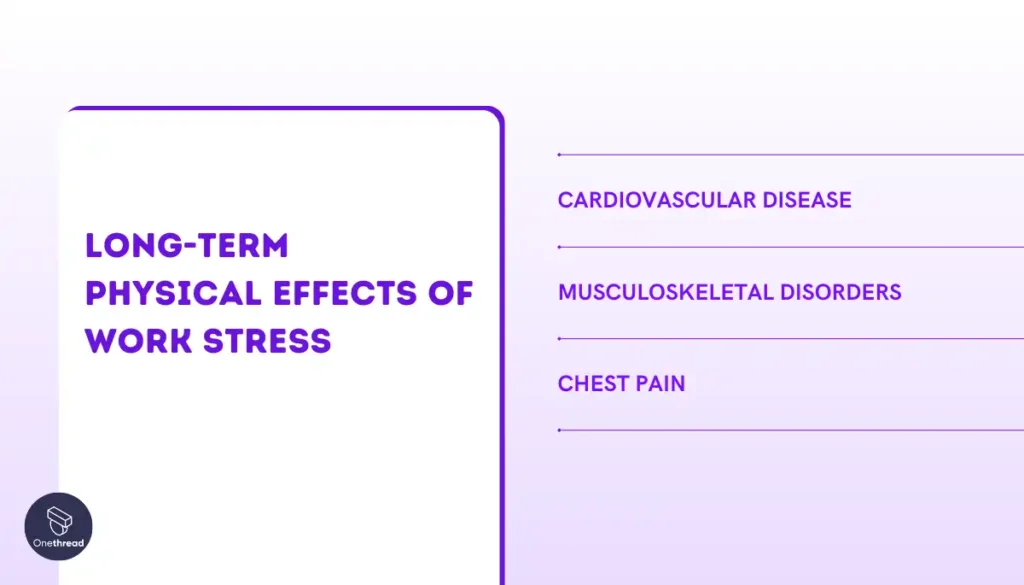
Prolonged exposure to stressful work environments can lead to various long-term health issues, such as
1. Cardiovascular Disease
According to NIH, the Physical effects of work stress, particularly cardiovascular disease (CVD), have been extensively studied. Research from over 600,000 individuals across 27 cohort studies indicates a moderate increase in CVD risk due to work stressors like job strain and long working hours.
The risk elevation for those exposed to such stressors is estimated to be between 10-40% compared to those not experiencing them.
Chronic stress contributes to high blood pressure, increased cholesterol levels, weakened immune system, anxiety, and inflammation levels – key risk factors for stroke, heart attack, and other cardiovascular diseases.
Causes:
- Extended periods of surging stress hormones
- Chronic activation of immune/inflammatory pathways
Chronic stress contributes to cardiovascular disease in several ways:
- Directly affects physiological processes that increase CVD risk like high blood pressure, blood sugar, cortisol levels, etc.
- Contributes to unhealthy behaviors like poor diet, smoking, and lack of exercise.
- Causes mental health issues like anxiety and depression that independently increase the risk of chronic health problems.
2. Musculoskeletal Disorders
Repetitive physical job demands and sustained awkward positions lead to cumulative trauma and injury to joints, tendons, muscles, and spinal discs over time.
Causes:
- Forceful exertions
- Awkward static postures held for long periods
- Insufficient recovery time between repetitions
3. Chest Pain
Stress can cause temporary chest tightness or discomfort that mimics heart attack symptoms. This is likely due to muscle tension, changes in breathing patterns, and anxious thoughts.
Causes:
- Shallow rapid breathing from fight or flight response
- Muscle tension around the chest/heart region
- Misinterpretation of harmless symptoms.
Work-related stress adversely impacts physical and mental health, increasing the risk of cardiovascular disease, gastrointestinal issues, musculoskeletal disorders, and psychological ailments. Managing stress is crucial for overall well-being.
Behavioral Effects of Work-Related Stress
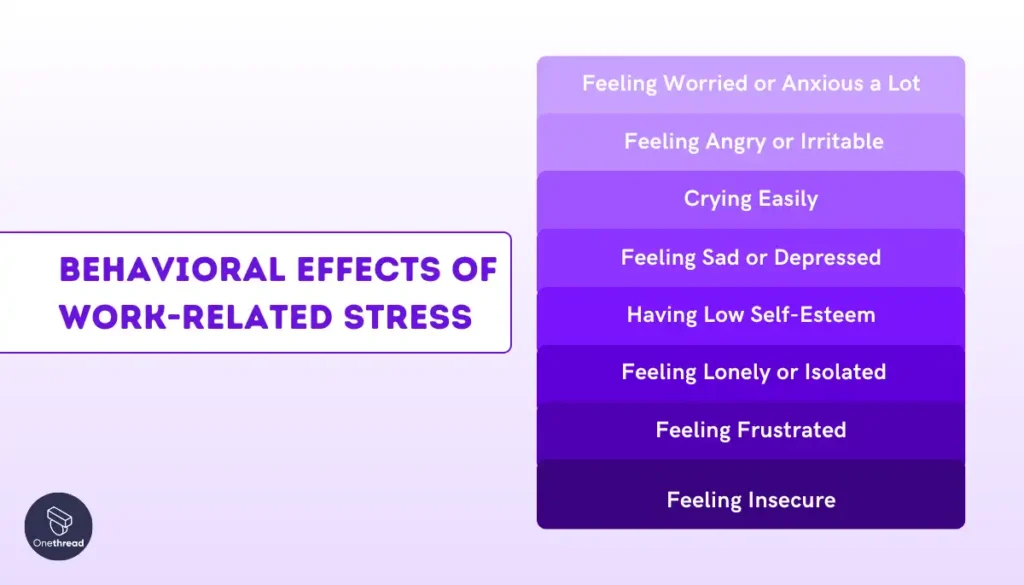
Behavioral effects of work stress are feeling worried, sad, or upset. It can make it hard to think clearly or make decisions. You might feel tired even if you didn’t do anything physical.
It can also make you feel alone or that you don’t want to be with friends or family. Sometimes, you might get angry easily or feel nervous. Work stress can make it hard to sleep well or enjoy things you usually like. It’s important to talk about these feelings and find ways to feel better.
1. Feeling Worried or Anxious a Lot
When stressed, you may constantly worry, and feel anxious about tasks or deadlines. This anxiety can overshadow rational thinking, leading to increased stress levels. Research shows that workplace anxiety affects 40% of workers, impacting productivity and mental health.
Causes:
- Fear of failure/consequences
- Uncertainty about job security
- Pressure to meet high expectations
2. Feeling Angry or Irritable
Increased irritability or anger in the workplace can be a sign of stress. This emotional state can result from feeling overwhelmed or undervalued. Anger linked to stress can strain professional relationships and contribute to a negative work environment. It can Increase impatience, short temper, and emotional outbursts.
Causes:
- Feeling overworked/undervalued
- Lack of control over situations
- Unclear expectations
3. Crying Easily
A lesser-discussed symptom of workplace stress is a lowered emotional threshold, leading to tears over what might normally be minor issues. This emotional response can signal excessive stress or burnout, requiring attention and support.
Causes:
- Diminished coping abilities
- Increased emotional reactivity
- Feelings of inadequacy
4. Feeling Sad or Depressed
Long-term stress can lead to feelings of sadness or depression, affecting your outlook on life and work. Persistent workplace stress can significantly increase the risk of developing depression, underscoring the need for proactive mental health strategies in the workplace.
Causes:
- Changes in brain chemical balance
- Loss of meaning/purpose
5. Having Low Self-Esteem
Stress can erode confidence, leading to low self-esteem. This can result from constant criticism or unrealistic job expectations, making individuals doubt their abilities.
Causes:
- Harsh criticism from leadership
- Unachievable standards
- Lack of positive feedback
6. Feeling Lonely or Isolated
Workplace stress can cause feelings of isolation, especially in remote work setups. Lack of social support exacerbates stress, making one feel disconnected and lonely.
Causes:
- Remote work arrangements
- Hyper-focus on tasks
- Lack of social connections
7. Feeling Frustrated
Persistent stress often leads to frustration. This emotion arises when obstacles prevent you from reaching goals, leading to feelings of stagnation and dissatisfaction.
Causes:
- Conflicting priorities
- Bureaucratic obstacles
- Insufficient decision-making input
8. Feeling Insecure
Job insecurity and workplace changes can trigger stress, causing feelings of insecurity. This uncertainty can affect one’s emotional well-being and job performance.
Causes:
- Fear of job loss
- Lack of growth opportunities
- Organizational changes
From above the most extreme level, if stress is getting in the way of your happiness, health, or ability to do your job, it’s time to make some changes. Don’t ignore the signs – talk to your boss, family, or doctor so you can feel better. Learning ways to manage stress can help you get back on track.
Psychological Effect Of Work-Related Stress
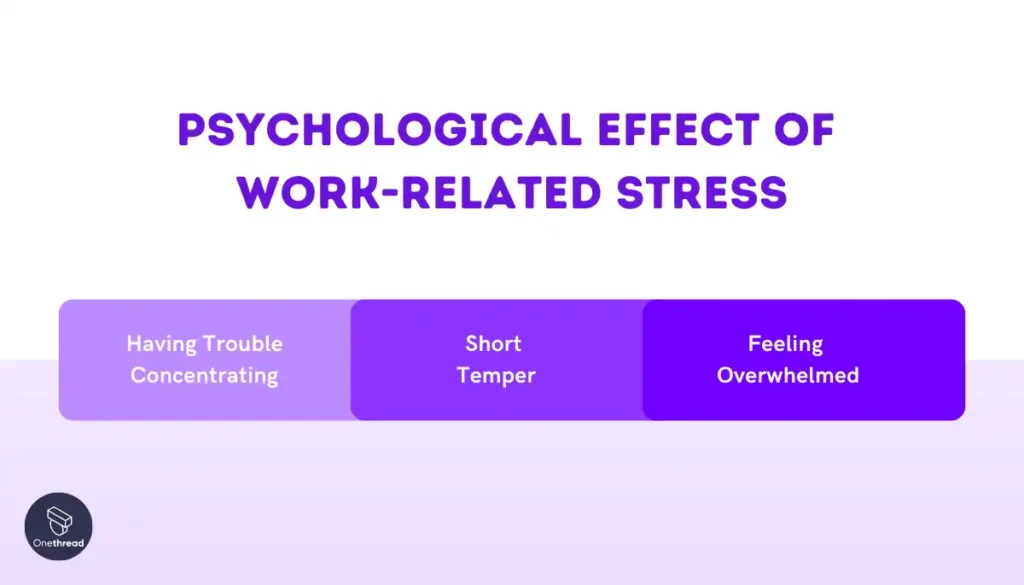
Work stress affects our minds in several ways. It can make it hard to focus because we’re juggling too many things or worried about work problems. This often leads to feeling scattered and unable to concentrate.
Stress can also make us quick to anger, as we feel frustrated or threatened, impacting our relationships at work. Furthermore, when work piles up, we might feel overwhelmed, thinking we can’t handle it all. This is due to too much work, unclear priorities, or not enough support.
These feelings can hurt our productivity and mental health, making us feel stuck and unhappy with our jobs.
Work stress can deeply affect our minds and feelings. Here’s how:
1. Having Trouble Concentrating
Stress can scatter your focus, making it hard to concentrate on tasks. This is often due to an overload of worries or multitasking demands.
Causes:
- Preoccupation with stressors
- Information overload
- Multitasking demands
2. Short Temper
Irritability and anger are natural responses to threatening or frustrating situations at work. If unchecked, can undermine workplace relationships.
Causes:
- Feelings of lost control over workload/processes
- Fatigue from sleep issues patience
- Fight or flight response to workplace threats
3. Feeling Overwhelmed
When tasks pile up, it’s common to feel overwhelmed. This feeling can lead to a sense of being unable to cope with work demands, impacting productivity and mental health.
Causes:
- Excessive workload
- Unclear priorities
- Insufficient resources/support
Effects of Work Stress on The Organization
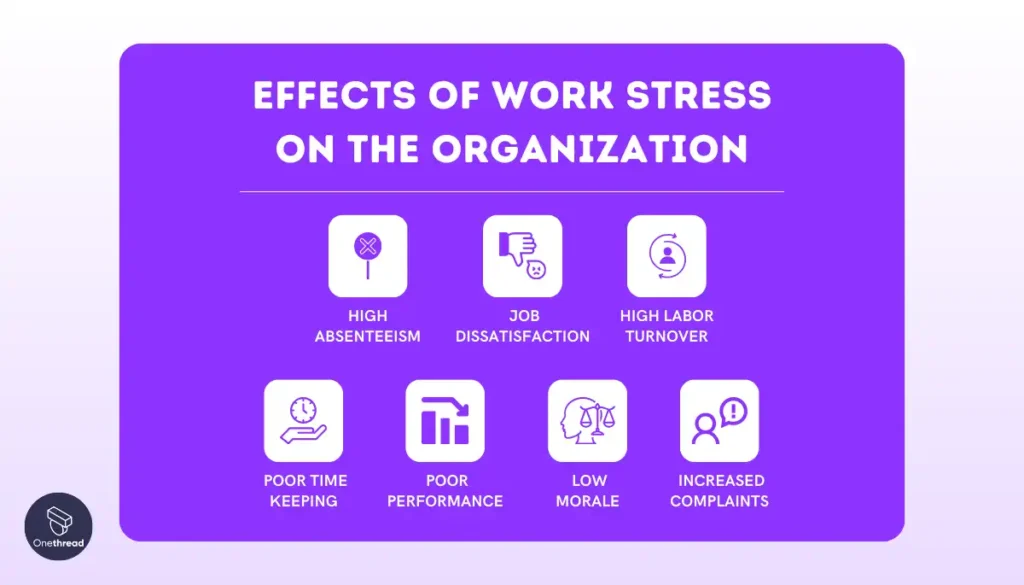
The Effects of Work Stress On The Organisation are less teamwork and more mistakes at work. People may not come to work because they feel sick or unhappy.
This can make it hard for the company to do its job well. Sometimes, workers may leave their jobs because they are too stressed, which means the company has to spend time and money to find new people.
Work stress can also lead to arguments or bad feelings among workers, making it a not-so-nice place to work. When everyone is stressed, the quality of the work can go down, and the company might not make as much money or do as well as it could.
According to the University of Cambridge, the effects of work stress on organizations include:
1. High Absenteeism
Stressed employees take more unauthorized leaves or sick days to avoid workplace stressors. This reduces the available workforce, increasing burdens on other employees.
Causes:
- Avoid dealing with problems
- Fatigue/illness from chronic stress
- Disengagement from an unsatisfying job
2. Job Dissatisfaction
Work overload, lack of autonomy, and limited rewards can quickly lead to discontentment, loss of motivation, and detachment from job duties.
Causes:
- Mismatch between skills/interests and job duties
- Perceived lack of control and meaningful input
- Insufficient compensation and recognition
3. High Labor Turnover
Excessive workplace stress often motivates employees to seek jobs elsewhere. High turnover is hugely disruptive and expensive due to recruitment, training, and loss of organizational knowledge.
Causes:
- Health effects reduce the ability to perform the role
- Lack of coping resources/support
- Better opportunities to escape stressors
4. Poor Time Keeping
Struggling employees have difficulty arriving on time or taking appropriate breaks due to fatigue, sadness, or disengagement related to high-stress levels.
Causes:
- Worry/rumination interfering with sleep
- Lethargy/apathy from depression
- Loss of motivation
5. Poor Performance
Preoccupied, exhausted, or detached workers are more likely to underperform – making costly errors and getting less productive work done overall.
Causes:
- Concentration issues from anxiety
- Diminished decision-making capability
- Presenteeism
6. Low Morale
Poor leadership, lack of trust, and limited growth opportunities can degrade enthusiasm, loyalty, and sense of purpose at work.
Causes:
- Poor communication/support from leadership
- Focus on criticism rather than positive feedback
- Limited training and development options
7. Increased Complaints
Frustrated employees have more grievances about working conditions, lack of resources, or insufficient leadership support when under excessive stress.
Causes:
- Poor psychosocial safety climate
- Restricted upward problem-solving
- Lack of constructive feedback processes
How to Manage Work Stress?
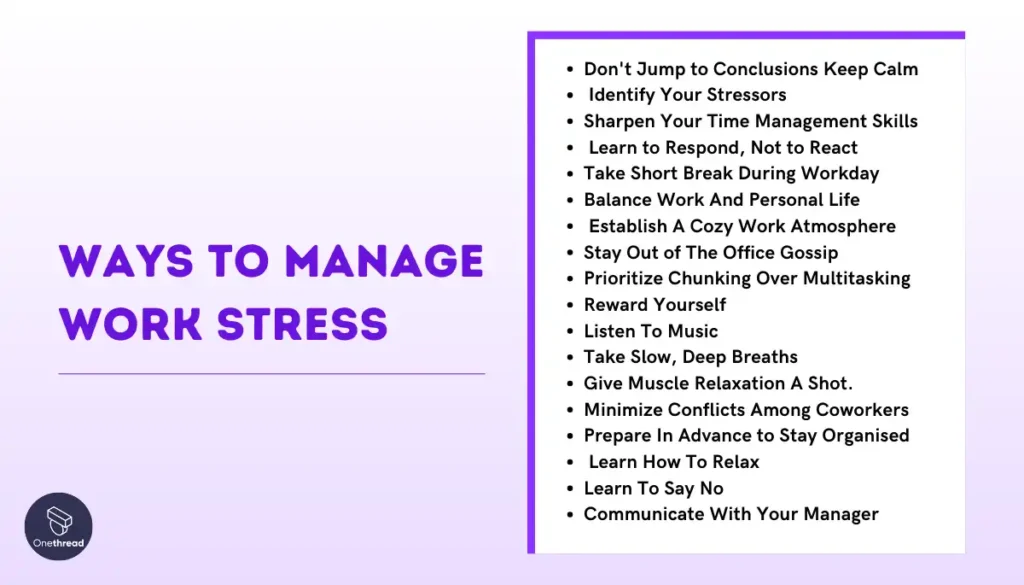
Managing work stress is important for your happiness and health. Think of stress like a heavy backpack. To lighten it, take breaks to relax. Imagine your favorite place during these breaks. Talk about your feelings with friends or family; sharing makes your backpack lighter.
Make a list of what you need to do. Tackle one thing at a time, starting with the easiest. Remember, it’s okay to ask for help when tasks feel too big. Lastly, make sure to rest well at night; sleep helps repair your mind and body, making your backpack feel lighter the next day. Here are 18 tips in more detail:
1. Don’t Jump to Conclusions Keep Calm
Jumping to conclusions can add to work stress. Before you worry, take a deep breath. Understand what’s really happening. Ask, “What’s the worst that can happen?” Often, it’s not as bad as you think. Break tasks into smaller steps.
Focus on one thing at a time. This makes big problems feel smaller and more manageable. Remember to talk to someone if you’re feeling overwhelmed. Sharing your worries can make them feel lighter. Stay positive and take things one step at a time.
2. Identify Your Stressors
Identifying what stresses you at work can help you manage it. Why? It clears your mind, like tidying up a messy room. How? Grab a notebook and jot down everything that’s bothering you.
Seeing it on paper makes it easier to tackle. You can then sort these stressors by what you can change and what you can’t. Focus on solving the ones you can change.
For the rest, think about ways to let them go. This method helps you control your stress, not let it control you.
3. Sharpen Your Time Management Skills
Improving your time management can greatly reduce work stress. Why does this matter? When you manage your time well, tasks don’t pile up, and deadlines don’t seem as scary.
How can you do this? Start by planning your day. Use a calendar or planner to organize tasks. Prioritize them: what needs to be done now, and what can wait? Learn to say no to tasks that overload your schedule.
Also, take short breaks to recharge. This way, you’ll feel more in control and less overwhelmed, turning a mountain of stress into manageable hills.
4. Learn to Respond, Not to React
Learning to respond, not react, is key to handling work stress. When we react, we have a knee-jerk emotional response fueled by anger or anxiety. Responding means choosing our reactions mindfully.
Remaining calm in stressful situations takes practice. Start by catching yourself when you have a strong negative reaction and pause. Take a few deep breaths to calm your nervous system before saying anything. Choose your reaction by thinking before speaking.
Communicate your needs clearly and directly without blame or accusation. Managing work stress starts with changing our reactions into thoughtful responses. Keeping cool under pressure allows us to handle challenges mindfully.
5. Take Short Break During Workday
Taking mini-breaks helps relieve work stress. When we stare at our screens for hours without a reprieve, tension builds in our minds and bodies.
Getting away from your desk, even for 5-10 minutes, allows you to reset mentally. Short breaks give your brain a chance to recharge so you return feeling more focused. Go for a quick walk outside if possible. Breathe deeply. Listen to calming music.
Meditate or do light stretches. Eat a healthy snack like nuts or fruit. The goal of mini-breaks is to give a mental intermission from thinking about work. By clearing your head, you’re better able to handle job demands, and lowering daily stress improves overall well-being.
6. Balance Work And Personal Life
Setting boundaries between work and personal life reduces stress. Leave work at work by silencing notifications after hours. And don’t bring home projects.
Protect personal time to unwind and recharge through hobbies, socializing, exercise, or family time. Scheduling breaks between meetings also helps you compartmentalize work.
The goal is dedicating your full focus to one aspect of life at a time. Segmenting work from personal life prevents preoccupation that breeds anxiety.
7. Establish A Cozy Work Atmosphere
Creating a comfortable workspace helps minimize work stress. Consider lighting, temperature, noise level, and other sensory details. Make sure your chair and desk setup align ergonomically with your body to prevent tension or strain.
Decorate your space with plants, artwork, photos, or other meaningful touches. Play relaxing background music. Keep healthy snacks and drinks on hand. Having control over your environment goes a long way toward making your workday more enjoyable.
A few simple tweaks can yield big dividends through increased focus and productivity.
8. Stay Out of The Office Gossip
Avoiding office gossip reduces work stress. Talking about coworkers or company politics breeds negativity. It can be tempting to vent, but gossiping often backfires by damaging relationships or reputations.
If others try engaging you, politely divert the discussion to constructive topics or excuse yourself. Refrain from speculation about internal affairs. Focus conversations on your shared work objectives, current projects, or innovative ideas.
Maintaining professionalism and positivity with all colleagues creates a peaceful work environment.
9. Prioritize Chunking Over Multitasking
When juggling many tasks, chunking is more effective than multitasking. Chunking means dedicating uninterrupted time to individual work blocks. Set a timer for 90-minute intervals and get absorbed in a single priority task during that scheduled chunk, rather than flitting from one half-started job to another.
This intentional focusing allows your brain to dive deeper without distraction. You may accomplish more total tasks by methodically chunking than frantically multitasking. Reduce work stress by assessing your to-do list and assigning dedicated blocks of time to strategically chip away at top priorities first.
10. Reward Yourself
Using small rewards as reinforcement helps manage work stress. Celebrate progress as you check items off your heavy workload, rather than feeling solely overwhelmed by what remains undone.
Mix necessary but less stimulating projects with more complex engaging tasks to stay motivated. Build in healthy treats to break the monotony, like going outdoors for lunch or briefly calling a friend between assignments. Have an end-of-week ritual to unwind.
When you produce excellent work while also listening to your mental health needs, reward yourself for the achievement.
11. Listen To Music
Music has restorative powers against work stress. Play relaxing, lyric-free background music softly in your workspace. Peaceful piano, light jazz, or gentle classical pieces elevate mood while still allowing full concentration.
Upbeat pop and rock songs might disrupt focus but can revive energy during designated break times when you’re not actively working. Brief musical breaks stimulate productivity more sustainably than just powering through a long stressful shift, risking mental fatigue.
Create playlists for work versus transition times and watch your tension smoothly diminish.
12. Take Slow, Deep Breaths
When work stress strikes, take slow, deep belly breaths. Inhale gently through your nose, feeling your abdomen expand with air. Exhale slowly out through pursed lips.
Repeating mindfully for just one minute can relax the body and calm anxious thoughts. Portable small weights on your chest can enhance the calming effect through added resistance to focus your breathing.
The vagus nerve connects your lungs and brain, signaling safety when you consciously control your breath. This free, easy technique taps our innate physiological response to stress. Simply remember to step back and breathe.
13. Give Muscle Relaxation A Shot.
Progressively tensing and then relaxing muscle groups reduces work stress. Sit or lie comfortably. Breathe deeply. Squeeze one muscle group like your hands or calves for 5-10 seconds, then release suddenly.
Feel the tension melt away. Continue contracting and releasing other muscle areas one by one. Comparing tension to relaxation highlights how much lighter your body feels without chronic strain.
As your system calms, imagine soothing scenes like ocean waves. Finish by resting limply like a ragdoll to integrate that relaxed sensation. With practice, this method can work wonders against mounting workplace anxiety.
14. Minimize Conflicts Among Coworkers
Preventing and resolving conflicts with colleagues minimizes work stress. Seek first to understand differing perspectives when disputes arise. Find common ground and reinforce shared priorities.
Address issues directly but avoid accusatory language that puts others on the defensive. Politely discuss problems at appropriate times, not in front of audiences. Follow official protocols for reporting major conflicts that can’t be privately resolved.
Cultivating personal rapport and professionalism makes a workplace more harmonious for all. Lead with empathy, patience, and constructive solutions instead of blame.
15. Prepare In Advance to Stay Organized
Preparedness beats work stress. Plan tomorrow’s schedule tonight before leaving the office. Review priorities and block time to tackle big projects proactively. Prepare documents, files, or data ahead of meetings.
Arrive early next morning to ensure you have what you need. An organized, thoughtful approach prevents feeling overwhelmed as the day’s demands avalanche unexpectedly.
Collect key contacts’ details in one handy directory to prevent scramble searching when urgent issues arise. Follow checklists to methodically manage complex assignments. Staying one step ahead with readiness plans fosters confidence in facing workplace challenges.
16. Learn How To Relax
Mastering relaxation techniques helps manage work stress. Meditation, deep breathing, yoga, visualization exercises, and progressive muscle relaxation activate the body’s natural stress resilience.
Practice regularly before pressure peaks so go-to calming methods are second nature when you most need them. Relaxation abilities strengthen with discipline just like any skill set. Notice situations that elevate your stress response and apply a soothing strategy right away, rather than letting tensions accumulate.
Learning evidence-based relaxation methods yields lasting abilities to self-soothe emotional reactivity during workplace pressure.
17. Learn To Say No
The power of “No” reduces work stress by eliminating overcommitment. Before accepting new assignments when already at capacity, ask for extended project timelines or reduced scopes first.
Explain why you cannot deliver quality work within unrealistic constraints. Say no outright if work-life balance boundaries are violated. Get priorities straightened when asked to take on additional roles without adequate compensation.
Be ready to propose alternative solutions showing you’re a team player. Judicious use of “No” prevents workplace exploitations that exhaust capacity and productivity. Letting others take unfair advantage breeds chronic work stress and resentment.
18. Communicate With Your Manager
Being candid with your manager alleviates work stress. First schedule an appropriate time for an open discussion, not a quick chat between tasks. Explain challenges preventing your best performance, like unclear expectations, unrealistic deadlines, or insufficient resources.
Suggest realistic solutions too, not just airing grievances. Maintaining positive rapport while addressing issues demonstrates professional maturity, not whining or excuses.
Have an ongoing open-door rapport with your supervisor to tackle frustrations early before they escalate from manageable concerns to overwhelming burnout.
Managing work stress involves understanding your stressors and responding with healthy coping mechanisms. Try different strategies to see what works best for you, and remember to seek support when needed.
Building Resilience Against Work Stress
Building resilience against work stress means learning how to bounce back from tough times at your job. It’s like being a rubber ball that, no matter how hard it hits the ground, always pops back up.
What Does Building Resilience Mean?
Building resilience is all about making yourself strong on the inside so that when things get hard at work, you can handle it without falling apart.
It’s like building a muscle; the more you work it out, the stronger it gets. When you’re resilient, you can see the bright side of tough situations, find ways to solve problems, and keep going even when things get tough.
Stress Resilience Techniques
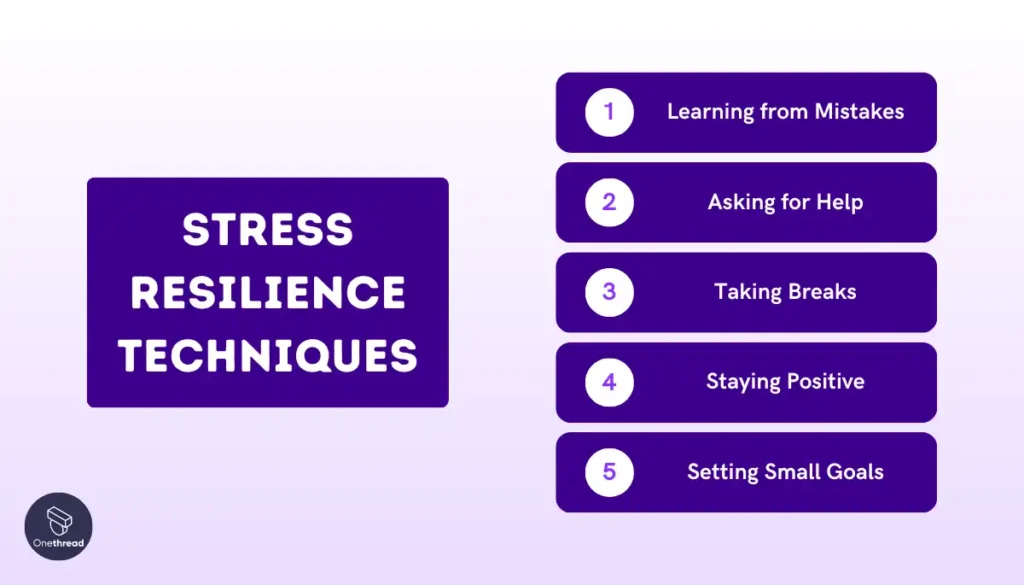
Here are some ways people show resilience against work stress:
- Learning from Mistakes: Instead of getting upset over a mistake, a resilient person thinks, “What can I learn from this?” It’s like if you fall off your bike but then get right back on to try again.
- Asking for Help: When work gets overwhelming, resilient people aren’t afraid to ask for help. It’s like asking a friend to explain a homework question you don’t understand.
- Taking Breaks: Sometimes, the best thing you can do is take a short break. It’s like pressing the pause button on a video game to rest your fingers.
- Staying Positive: Even when work is really hard, resilient people try to stay positive. They think about what’s going well, not just what’s going bad. It’s like focusing on the sunny days instead of the rainy ones.
- Setting Small Goals: Breaking big tasks into smaller pieces can make them feel more manageable. It’s like eating a pizza slice by slice instead of trying to eat the whole thing at once.
Being resilient doesn’t mean you’ll never feel stressed. It just means you’re better at dealing with it and not letting it knock you down.
When to Seek Help?
Knowing when to seek help is crucial if you’re feeling overwhelmed by stress at work. If stress starts affecting your health, mood, work performance, or relationships, it’s time to reach out. Here’s how to report stress in the workplace and find help:
- Talk to Your Supervisor or HR: They can offer support, adjustments to your workload, or resources to manage stress.
- Employee Assistance Program (EAP): Many companies have EAPs that provide confidential counseling and support services for personal and work-related issues.
- Professional Help: If work stress is affecting your mental health, consider talking to a mental health professional who can provide strategies and support.
Asking for help is a sign of strength, not weakness. It shows you’re taking steps to manage your well-being and maintain your performance at work. Everyone needs a helping hand sometimes, so don’t hesitate to reach out when you need it.
FAQs
What can trigger stress?
Stress triggers vary but often include heavy workloads, tight deadlines, job insecurity, conflicts with coworkers, and balancing work with personal life. Each person’s stressors might be different.
Can work stress make you sick?
Yes, work stress can lead to physical and mental health issues like headaches, stomach problems, anxiety, depression, and even weaken your immune system, making you more susceptible to illnesses.
How can I relax my mind after work?
To relax after work, try activities like meditation, reading, taking a walk, enjoying a hobby, or practicing deep breathing exercises. These can help clear your mind and reduce tension.
Who suffers from stress most?
Anyone can suffer from stress, but people facing constant pressure, major life changes, or those without a strong support network may experience higher levels of stress more frequently.
How to not let work stress you out at home?
To prevent work stress from affecting you at home, set clear boundaries between work and personal life, practice relaxation techniques, and engage in activities that you enjoy and find relaxing.
Closing Words
Managing work stress is crucial for maintaining your health, happiness, and job satisfaction. By recognizing stress triggers, seeking help when needed, and employing strategies like taking breaks and practicing mindfulness, you can effectively manage and reduce stress.
Remember, resilience against work stress is about bouncing back stronger and keeping a positive outlook, no matter the challenges. You’ve got the power to conquer work stress and thrive!
